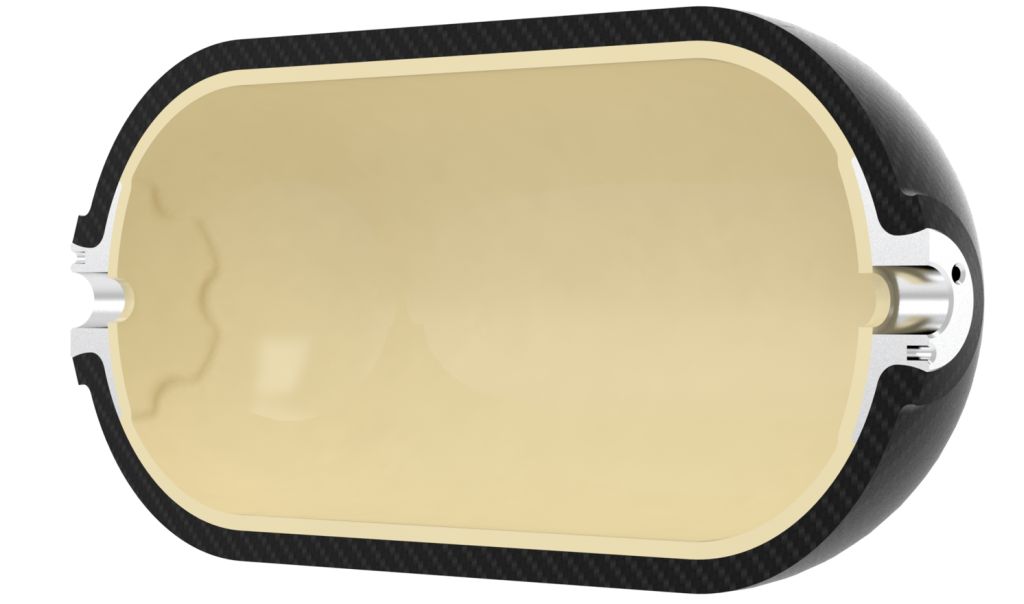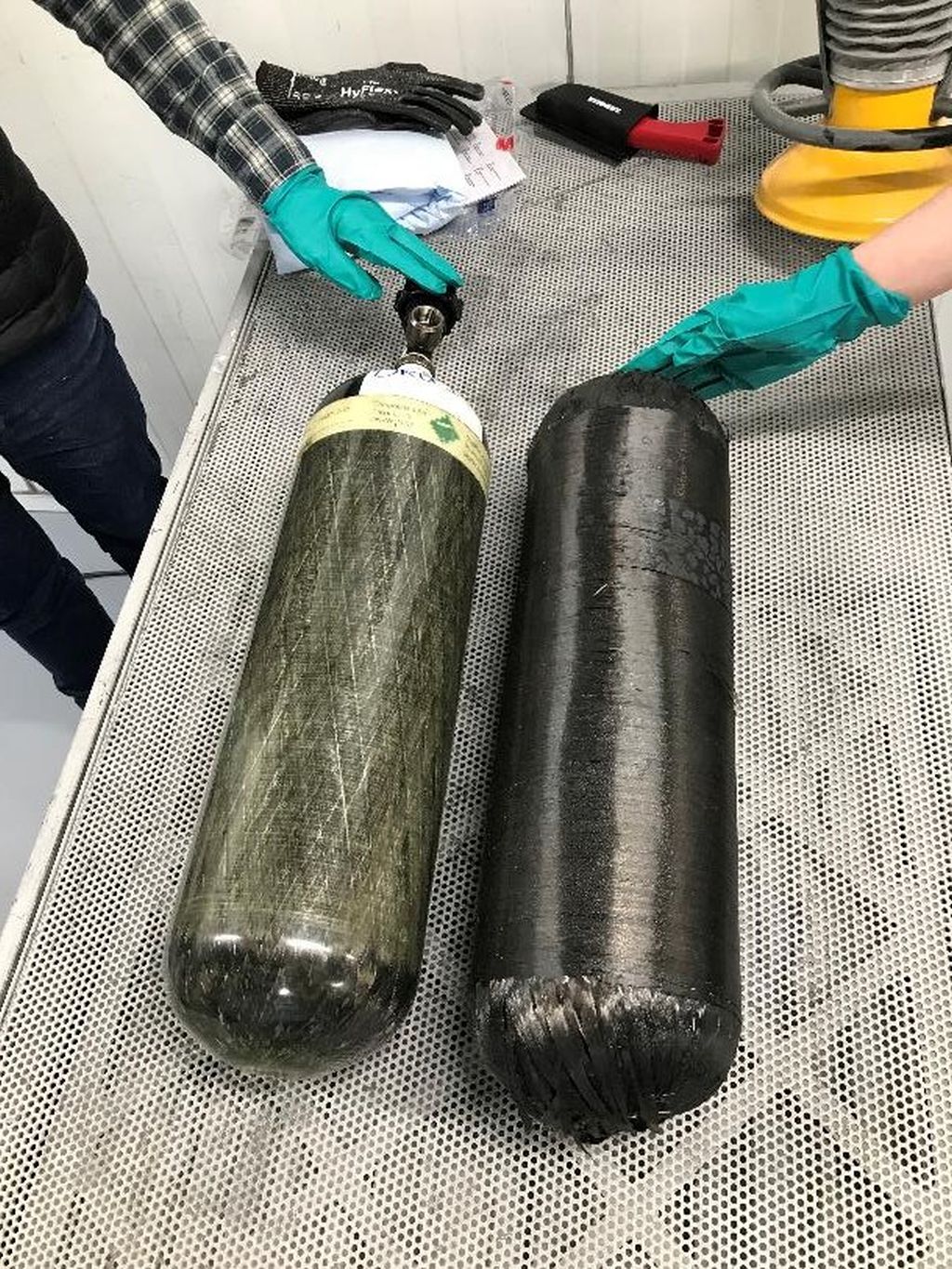New design techniques target net-zero

National Composites Centre (NCC) advanced research engineer, Camilla Osmiani takes a look at the future of digital engineering design and its application to a composite hydrogen pressure vessel.
Achieving net-zero targets within aviation is a huge challenge which will require coordinated efforts to improve the environmental and societal impact of air transportation. From zero carbon fuel to new materials through to aircraft design, innovation and new ways of working are crucial to make this step change.
To gain competitive advantage in a global marketplace, it is crucial for companies to digitalise processes to reduce product development timelines and maintain engineering leadership. For digital engineering, the use of Multi-Disciplinary Optimisation (MDO) techniques offer industry a new approach to product development, redesigning and remaking products with net-zero targets in mind.
Product design is the process of identifying and defining a combination of features that satisfies a prescribed set of requirements. These requirements often include competing objectives and constraints, and they address different aspects of the product and its constituent parts. Traditional engineering tends to be sequential, but the complex nature of most products calls for a concurrent approach to be addressed. It is in this context that MDO has been gaining momentum in the last decade.

The advantage of MDO is that its goal is to address all design elements of a product at the same time, resulting in superior design, lower development costs, faster new product introduction, and the ability to refine specific features to meet contrasting demands of different applications. It is a tool that could present a notable transformation in the competitive edge of British industry.
MDO is the process of finding the optimal solution to a set of design requirements that encompass multiple disciplines; from structures to manufacturing, operations, disposal, economic considerations, etc. The concept of MDO is particularly suited for products or systems made up of multiple coupled parts that cannot be designed and optimised in isolation.
The first step in setting up an MDO study is identifying the disciplines involved and understanding how they interact with each other. This enables the definition of the flow of information required for each discipline to be analysed. Typically, each discipline uses specialised software tools. MDO platforms enable integration between these tools so that data can be transferred seamlessly from one analysis module to the next, with the final goal of finding an optimum design, or set of designs, in a holistic fashion.
Our future energy mix
As hydrogen has emerged as one of the most promising solutions for achieving net-zero carbon emissions by 2050, the design of pressure vessels for transport and storage has been drawing increasing interest within industry, particularly within aviation.
The NCC is advancing the knowledge required to establish a dynamic UK supply chain, investing in hydrogen pressure vessel research and development to seed manufacture in the UK, progressing the technology to help it to remain competitive in the future. It is also part of the High Value Manufacturing (HVM) cross-Catapult Hydrogen Innovation Initiative (HII). This collaboration brings together the strengths and capabilities of the Catapult innovation centres to support growth in the UK hydrogen supply chain, overcome technology and integration challenges, and to establish an effective UK hydrogen infrastructure.
The NCC with partners B&M Longworth and Cygnet Texkimp announced in May 2022 that they had successfully recycled reclaimed continuous carbon fibres from a composite pressure tank. This was the first time this process has been achieved in the UK and represents a significant milestone in the development of Britain’s hydrogen capability. Demand for carbon-fibre is expected to grow five-fold between 2025 and 2030, exceeding global manufacturing capacity. Creating viable, low-cost recovery processes, that retain the inherent strength of continuous carbon fibres for recycling, is therefore key to the development of the hydrogen economy, and for the aviation sector.
Optimising the design
As part of the NCC-led Digital Engineering Technology & Innovation (DETI) and Hydrogen programmes, MDO has been applied to the design of a Type IV composite hydrogen pressure vessel, exploiting the benefits that digital design technologies can enable.
The design of composite pressure vessels is concerned with four main aspects: structural performance, manufacturing, weight, and cost. Among the constraints, the design must meet a minimum burst pressure, a minimum fatigue life, and a maximum permeance rate, typically prescribed by regulatory codes. Design objectives include the maximisation of the hydrogen to tank weight ratio and the minimisation of cost to make the product competitive in the marketplace. The sustainability potential of materials and manufacturing processes used should also be considered early in the design process.

Following an aspect-based decomposition of the system, setup of the pressure vessel MDO involved the identification of the analysis modules and software tools required to evaluate the product performance against constraints and objectives. A data structure matrix was used to map the relationship, or coupling, between the analysis modules and support the definition of a process flow for the optimisation of the pressure vessel.
A design space optimisation platform was used to conduct the MDO exercise. Previous research undertaken within the DETI programme involved the assessment of a range of commercial industry software available. HEEDS MDO, a design space exploration and optimisation software from the Simcenter portfolio produced by Siemens Digital Industries Software, was the platform selected for the implementation of this MDO process.
Fifty designs were evaluated in less than two hours and an optimal solution was discovered among 23 feasible designs, i.e., designs that satisfied all the constraint requirements. It is worth noting that a traditional design approach typically leads to a feasible design, which is not necessarily the optimum one. Further effort can be required to identify the optimum design. Finding the optimum design of a complex system such as a composite hydrogen pressure vessel was the goal of this proof-of-concept MDO study. Automating the design process identified the optimum design five times faster than a traditional design approach. This achieved the goal and significantly reduced the risk of human error in the process of data transfer. With the UK looking to position itself as a hub for agile, high-tech manufacturing, MDO presents an enormous opportunity to substantially improve product design, development, and manufacturing time to market.
The NCC’s vision is to be the world-leading authority in composite technology, accelerating the uptake of digital engineering technologies for sustainable composites, working with companies of all sizes from micro-organisations and start-ups to some of the world’s largest and most respected innovators. Providing expertise to deliver R&D and to pull technology through from fundamental research to industrial application, collaboration opportunities and access to DETI and Hydrogen programmes and research is available to all.








